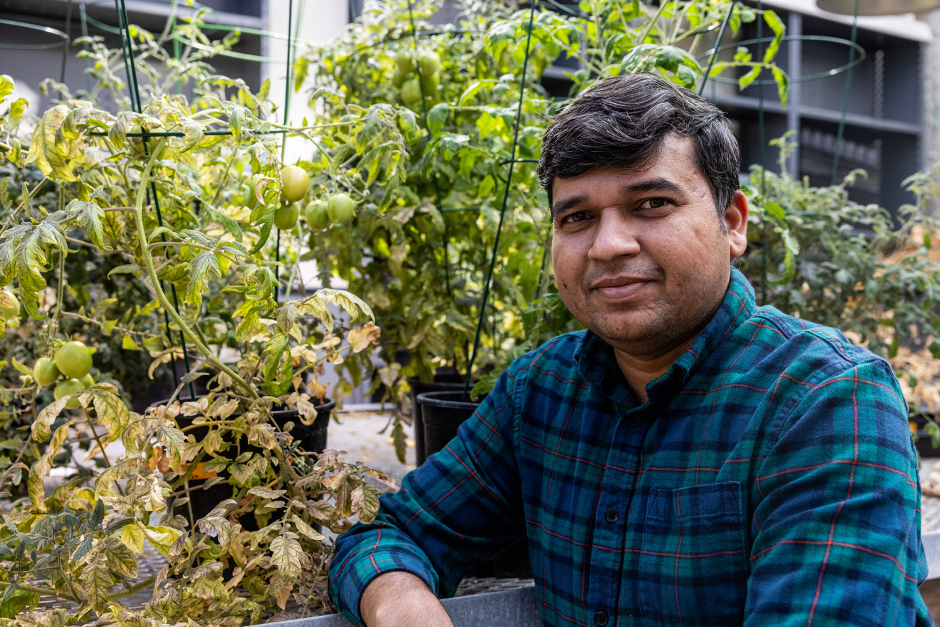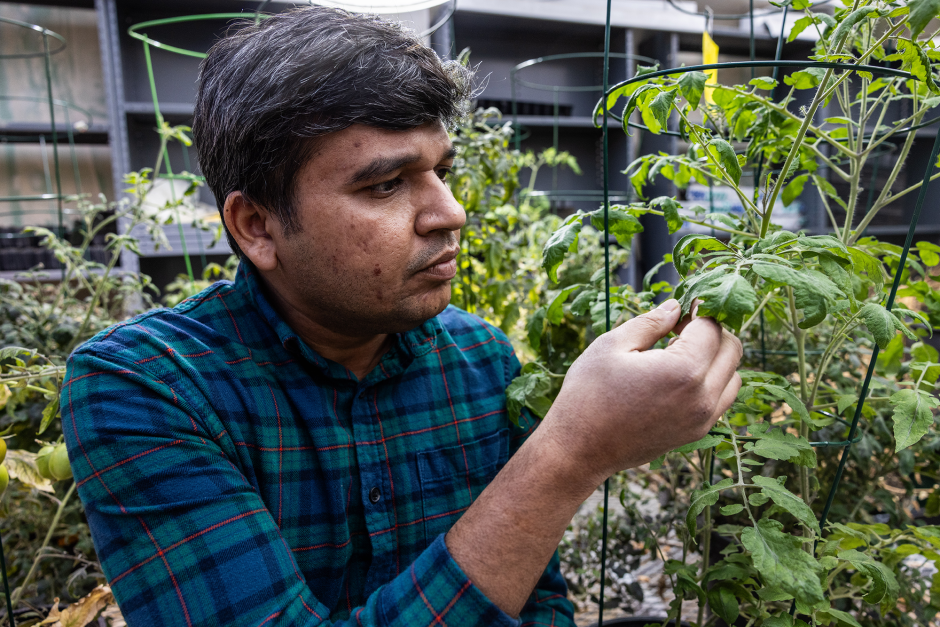
Feb. 10, 2025
Contact: Brian Consiglio, consigliob@missouri.edu
Photos by Abbie Lankitus
Plants produce special molecules that act like natural pesticides to help defend themselves against pests. Unfortunately, they don’t make enough of these molecules, leaving plants vulnerable to pests such as the Colorado potato beetle, which can result in damaged crops and economic losses for farmers.
Now, researchers at the University of Missouri may have found a solution.
In a recent study, scientists discovered that a scaffold protein — a protein that helps organize and regulate other proteins — acts as the plant’s unsung hero to help facilitate the production of these protective molecules.
The discovery unlocks the door to a wide variety of future opportunities for genetically modified plants and biocontrol agents that ultimately strengthen crops’ protection against pests and pathogens.
Prashant Sonawane, an assistant professor in the College of Agriculture, Food and Natural Resources, is leading the work.
“Now that we know how these compounds are made, it is a game changer because we can use metabolic engineering approaches — advanced technologies that Mizzou has invested in — to try to increase production of these compounds, ultimately leading to stronger, more resilient crops and benefitting farmers,” Sonawane said. “Some of the compounds in plants can also potentially be used in cancer treatments or to treat neurodegenerative diseases, so our efforts to increase production of certain compounds can benefit human medicine in addition to agriculture.”
A small protein, but a big difference
For the study, Sonawane compared two similar plants from black nightshade, Solanum nigrum, belonging to the Solanaceae family, which also includes important agricultural crops like tomatoes, potatoes and eggplants. One plant was genetically altered to remove the scaffold protein, while the other remained a wild type, or “normal” plant.
“We found that when we remove the scaffold protein from the plant, the plant suddenly becomes very susceptible to damage from pests and pathogens, but not the wild type plant with the scaffold protein,” Sonawane said. “These two plants were both growing in the same environment in a greenhouse, so we knew the scaffold protein was regulating the biosynthesis of the plant’s protective compounds.”

The various pathogens that damage plants — including viruses, bacteria, fungi and parasites — can often be as smart as the plants they destroy. Sonawane explained that while a plant has a defense system, a pathogen often evolves to overcome it. The plant then produces new compounds to combat the evolved pathogen, and the pathogen evolves again.
“This co-evolution is a constant game of cat and mouse, good versus evil,” Sonawane said. “We want to ultimately help farmers protect their plants against pests and pathogens. With this new knowledge of the role the scaffold protein plays, our lab will use various strategies to engineer the high-value compounds in the plants in greater amounts. We want to make a sustainable production platform system so these high-value compounds can be extracted more easily. The potential of this scaffold protein is still untapped, so we are excited to continue our research.”
Just getting started
Sonawane came from Germany to further his research at Mizzou after visiting campus and learning about the available infrastructure and opportunities for interdisciplinary collaboration.
Mizzou, he said, will help take his research to the next level.
“I am impressed with Mizzou’s research infrastructure and facilities, including the fantastic metabolomics facility, the Bond Life Sciences Center, the Electron Microscopy Core at the Roy Blunt NextGen Precision Health building, the East Campus Plant Growth Facility and the highly sophisticated machines on campus that allow us to analyze plant materials and learn what compounds are produced,” Sonawane said. “When it comes to agriculture and plant sciences research, Mizzou is on another level, and that is why I came here.”
“A scaffold protein manages the biosynthesis of steroidal defense metabolites in plants” was published in Science.



